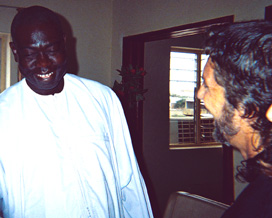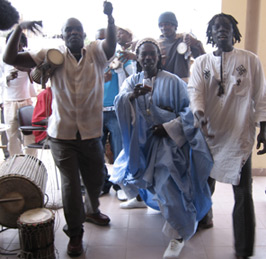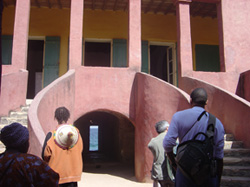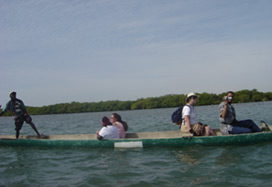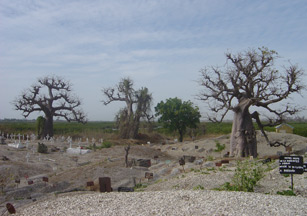OUR ADVENTURES,
Days 10 - 12
Featuring Meeting with the Mayors, Art in Senegal, Visit to Goree Island, Trip to Joal Fadiout, the Tabaski Holiday, and Answers to Questions from Schools
|
|
|
Pape Bathie Pouye, our friend from the Gokh-Bi System, arranged for our crew to have a private audience with the mayors of Pikine, Guinaw Rail South, and Guinaw Rail North, three sections of Dakar, the capital city of Senegal. Following the private meeting, the mayors had arranged for a very lively community meeting. Tony had brought a beautiful letter of friendship and peace from the mayor or Northampton, MA which he gave to the Mayor of Pikine and read to the audience. He extended a welcome to all of them to come visit us back in the US whenever they could. Click below to see Tony Vacca's description of the event, the full text of the mayor's letter, and a photo album of the event.
|
| |
|
|
|
Art in Senegal |
| Art has been encouraged and sponsored by the government in Senegal since the first president, Léopold Sédar Senghor, a poet himself, used his influence to encourage artists. At the mayor's meeting we noticed several beautiful sculptures decorating the hall. We were introduced to the artist, Ibrahima Diop, who is now corresponding with our crew and our school children here in the United States. He has invited you, too, to email him at Artise.diop@hotmail.com |
|
From left to right: 1) "Hands of Peace"carving by Ibrahima Diop, 2) friends bring Ibrahima over to meet Debby,
3) "Emancipation des Femmes" carving that Ibrahima gave to Debby, 4) we introduce Mr. Diop to Zan Lombardo - SA crew member and artist, 5) photo sent to us by Mr. Diop showing his sculpture of a lion, the national symbol of Senegal, which he is presenting to President Abdoulaye Wade with Mayor Niang in attendance. |
|
|
|
We went to visit Goree Island today - the beautiful yet tragic island where African captives were held and then put onto ships to be taken to other countries and sold as slaves. Everyone was deeply troubled by the extremely sad truths with which we were confronted, but we are all so appreciative that this exhibit exists to educate people from all over the world. Hopefully, we can all learn from humanity's mistakes of the past.
Click here to see a poetic and informative report of the day.
Click here to see a photo album of our visit.
Click here to link to a diagram of a slave ship
Click here to view a lesson plan to use with your classes
Click here to download "Goreé," a song from Tony Vacca's Zen Rant CD
|
|
|
Trip to Joal Fadiout |
|
Many of our crew traveled to this twin town which is about two hours south of Sobobade. It's known for two things. Muslims and Christians live there side by side in peace, and one of the towns is on an island created solely from millions of mussel and clam shells.
The Christian church was decorated with intricate tile work. We heard that the service is very exciting and full of music. The mosque was smaller, but brightly painted. (Photo album under construction) |
|
We saw the graveyard which is the only combined Muslim and Christian graveyard in Senegal. It's dotted with baobob and other beautiful trees. If you look closely in this picture, you can see Christian crosses on the graves to the left and Muslim signs on the graves to the right. |
|
|
|
As we traveled around Senegal over the last few days, we kept seeing large herds of goats, even in the middle of Dakar. We asked why they were there because it sure didn't look like a normal city scene to us. Our Senegalese friends told us that Tabaski was coming and you could see the excitement in their eyes! Moise was planning to go to Casamance and Pape was planning his trip to the Gambia so they could share the feasting and celebrating with their families.
We found out that Tabaski is one of the biggest holidays of the year in Senegal. This festival commemorates Abraham's willingness to obey Allah who had ordered him to sacrifice his child. However, at the last moment, a beautiful horned ram was sent to Abraham to sacrifice instead of his son. In memory of Abraham's faithfulness to God and his triumph over the faith and doubt, families all over West Africa sacrifice a goat or sheep during this festival.
Shepherds from all over Senegal come into the big city to sell their goats on roadsides and parking lots. The date of Tabaski is based on the Muslim lunar calendar, and this year it fell on January 10-13, right after our group was scheduled to leave Senegal. So, we got to see, firsthand, herds of goats appearing in Dakar and all the small villages, and the markets absolutely bustling with holiday business.
In addition to the feast, the Tabaski tradition dictates that every family member should have new clothes to wear. (We also heard that this holiday tradition guarantees that each person gets at least one set of new clothes every year.) We could feel the pressure that every father and mother was feeling to find a way to provide for their family. When we visited the market in Dakar, the merchants were putting on extra pressure for us to buy, and they kept reminding us that they must get enough money for Tabaski.
|
Click on arrow to see slideshow
Music: Massamba Diop and friends on tama drums
(If you didn't get the movie, click here to download the newest version of Quicktime)
|
| |
Click on arrow to see slideshow
Music: Pape Sakho on kora
(If you didn't get the movie, click here to download the newest version of Quicktime)
|
Jason got to stay on in Senegal after the rest of us left, so he actually got to experience the holiday itself. Here's his account...
"On the morning of Tabaski, the whole family dresses in their nicest clothes, and goes to the mosque to pray. After that, they return home, and change into their shorts and T-shirts, and begin preparing the goats. At Massamba's house, the whole family works together to prepare the feast, which itself is served like other meals: with rice, in a large serving dish, on the floor, with everyone huddled around it. Like Thanksgiving, there are many leftovers, and goat meat is expected to be found in every meal for the next few days.
After the meal, everyone takes naps and rests up for a while. Then they put on their nice new clothes again to go and visit other friends and family. Tabaski is a holiday that reminds everyone to share with their neighbors, so the children from each family take food to their neighbors and wish them long life and peace. Sometimes they receive gifts in return. This way, even the poorest families can participate in the feast.
Massamba had to work though, so I went with him to the Baaba Maal show in Guinaw Rail. The show was very crowded. Baaba Maal started the show solo with three acoustic songs. He was dressed very elegantly, and sat in a giant wooden throne with animal carvings. I got to play with them during the concert on keyboards. Afterwards, we came back home, exhausted, ready to wind down, and were treated to our first round of goat leftovers." |
|
|
Click here for answers to the first set of questions from the schools at home |
Click here for answers to the second set of questions from the schools at home |
|

